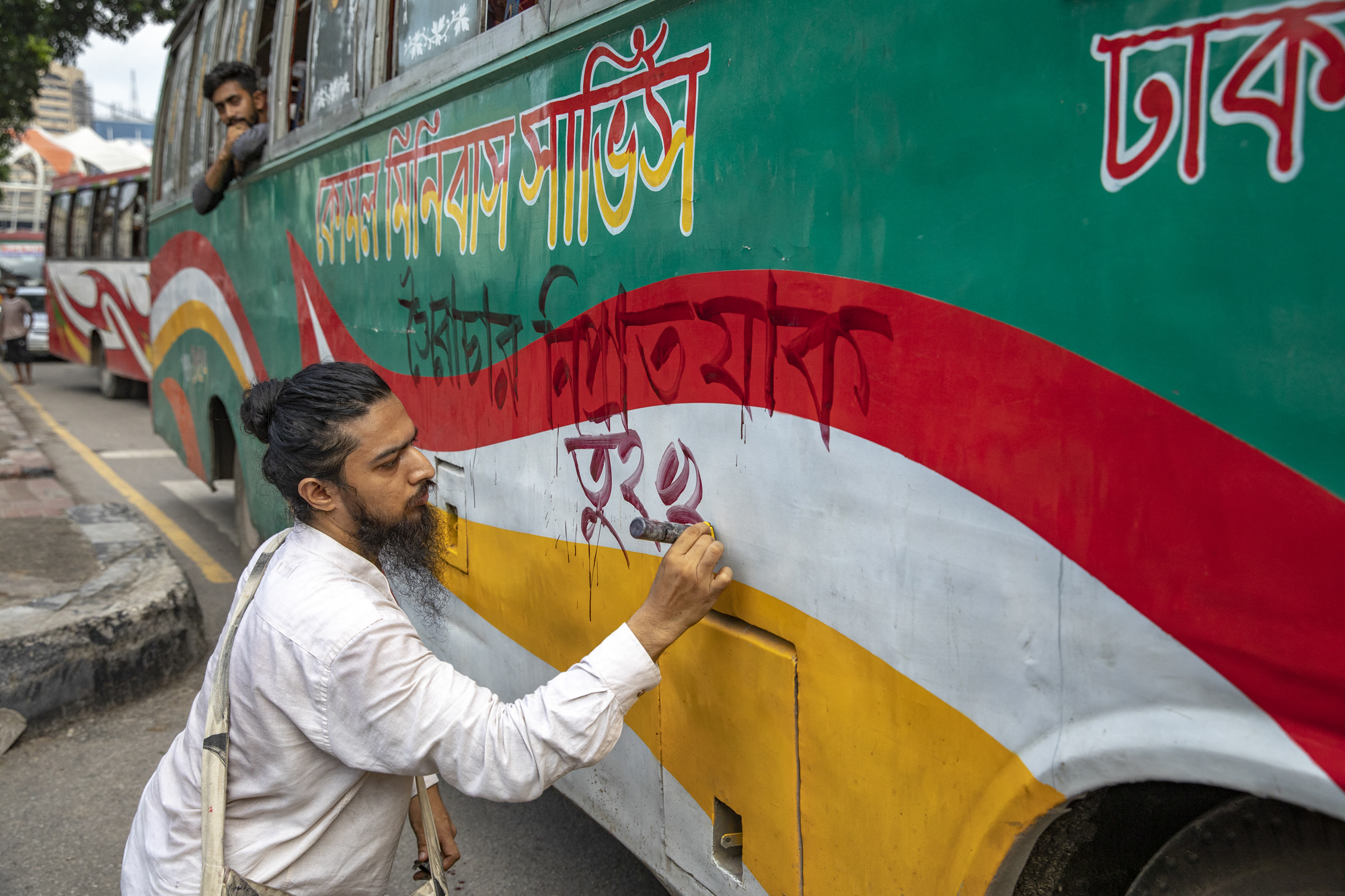
Switzerland withdraws from democracy support in Bangladesh

Promoting democracy around the world is one of Switzerland’s goals, but at the same time the funds for such efforts are dwindling. A case in Bangladesh illustrates what this means in practice.
Jiyana Madrajee is democracy activist from Sylhet in northeastern Bangladesh. The 26-year-old grew up in a family of tea pickers and belongs to the Hindu Telugu community, a minority group that makes up much of the tea-picking workforce. The plantations were established during British colonial rule, and workers were brought to the region from other parts of British India.

Madrajee is a member of the Youth Forum, a grassroots organisation in his region which has been championing the political rights of marginalised plantation workers since late 2023. This has been made possible in part due to Swiss support as the project benefits from Switzerland’s democracy promotion efforts. However, this may not be the case for much longer.
Global democracy promotion is one of Switzerland’s constitutional mandates and a key aspect of its foreign policy which makes it an integral part of Swiss development cooperation.
But like many other European countries, Switzerland is shifting its priorities toward defence and dipping into its development cooperation budget to fund it. For Bangladesh, this decision has far-reaching consequences as Switzerland has decided to shut down all its projects in the South Asian country by the end of 2028, including its support for democracy promotion.
Read more about it below:

More
End of Swiss development aid in Bangladesh sparks concern
Democracy under global pressure
By the end of 2024, almost three-quarters of the world population lived under authoritarian regimes, which is about the same level as in 1986. The Swiss foreign ministry calls this a “democratic recession”.
For this reason, Switzerland’s new guidelines commit to focusing on “strengthening the resilience of established, stagnating or backsliding democracies”.
Many observers would classify Bangladesh as such a backsliding democracy. Following a bloody uprising in summer 2024, the long-standing government of Prime Minister Sheikh Hasina, who had grown increasingly authoritarian with age, was toppled. Under her leadership, Bangladesh’s democracy constantly declined. Since then, a transitional government headed by Nobel Prize winner Muhammad Yunus has been steering the country.
Bangladesh would qualify for the foreign ministry’s goals, yet it seems likely that democracy promotion will be phased out at a crucial time.

The impact of democratic activism
Tea ranks among Bangladesh’s key agricultural exports sustaining half a million workers across more than 160 tea plantations. The tea pickers, over two-thirds of whom are women, earn the government-mandated daily wage of 170 Taka (around CHF1.25/$ 1.52). Even by Bangladesh’s standards that’s painfully low.
“The people in the tea gardens live like modern-day slaves,” says Madrajee adding that plantation owners, local politicians and even trade unions were all oppressing the workers. And it’s not just about low wages and poor working conditions, but also about political rights. “In past elections, tea pickers had to vote as a bloc and of course for the politicians and parties handpicked by the owner.” But Madrajee saw a significant change after the uprising last summer. “Before, local authorities would not take us seriously. Now, at least, they are willing to listen when we speak.”
Bangladesh is currently in political turmoil while shifting demographics are playing a key role too. With a median age of just 26, it was largely young people who led last summer’s uprising. “Young people in Bangladesh are dynamic, and there are lots of us. We should be a driving force in this country,” says Madrajee.
But going forward, the youth may have to push for change without Swiss backing. The Youth Forum works with RupantarExternal link, an organisation supporting similar initiatives across the country with funding from Switzerland. But come March 2026, that funding tap will be turned off. Rupatar says that without Swiss involvement, the continuation of its work could be jeopardised.
At the end of 2024, the Swiss parliament approved major cuts to development aid aiming to save nearly CHF450 million ($547 million) in the next three years. In contrast, bilateral aid to Ukraine is set to increase.
These cuts will also affect Bangladesh where Swiss engagement is due to phase out by 2029. In a statement, the government writesExternal link: This decision was based on the actual needs on the ground, Switzerland’s long-term interests (diplomatic and economic) and the added value of Swiss international cooperation compared to other countries.”
Switzerland has been supporting development projects in Bangladesh for five decades during which it has invested more than CHF1 billion ($1.22 billion).
First cracks appear
The future of the project’s funding is uncertain. When asked, the foreign ministry stated that democracy promotion was part of its 2026-28 transition programme. “Within this programme, Switzerland will continue to support the strengthening of democracy in Bangladesh.”
In Bangladesh, all eyes are on the upcoming announcement of the 2026 election date which could spark a fresh engagement with Switzerland. According to the foreign ministry, Switzerland may take part in an election observer mission.
Edited by Benjamin von Wyl
Adapted from German by Billi Bierling/ac

More
Our weekly newsletter on geopolitics

In compliance with the JTI standards
More: SWI swissinfo.ch certified by the Journalism Trust Initiative






























You can find an overview of ongoing debates with our journalists here . Please join us!
If you want to start a conversation about a topic raised in this article or want to report factual errors, email us at english@swissinfo.ch.